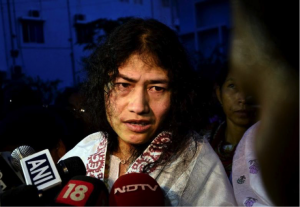 The longest-ever hunger strike came to an end when Sharmila, after 16 years, brought it to an end. She had started the hunger strike spontaneously after
Indian soldiers had killed 10 civilians in her home province of Manipur in India’s perennially troubled north-east. With the mounting civilian casualties,
her simple demand for the repeal of a law that gives soldiers immunity from prosecution resonated widely as her formidable endurance turned her into an
icon of resistance. While successive governments ignored her plight and paid scant regard to her demand, Sharmila spent 5,757 days in police custody,
charged with attempting suicide and being force-fed through a tube inserted in her nose.
The longest-ever hunger strike came to an end when Sharmila, after 16 years, brought it to an end. She had started the hunger strike spontaneously after
Indian soldiers had killed 10 civilians in her home province of Manipur in India’s perennially troubled north-east. With the mounting civilian casualties,
her simple demand for the repeal of a law that gives soldiers immunity from prosecution resonated widely as her formidable endurance turned her into an
icon of resistance. While successive governments ignored her plight and paid scant regard to her demand, Sharmila spent 5,757 days in police custody,
charged with attempting suicide and being force-fed through a tube inserted in her nose.
Despite her struggle, and criticism from various bodies, including India’s Supreme Court, the Armed Forces (Special Powers) Act (AFSPA), which has been regularly used since 1958 in troubled areas of India, still remains in force in a handful of states and territories in eastern India. Since 1990 it has been imposed on Kashmir. Under this legislation, soldiers are allowed to shoot to kill and the soldiers cannot be prosecuted without prior government approval, which is rarely granted. Even when such approval is given, the prosecution seldom results in conviction. Rights groups in the north east have documented 1,528 cases of alleged extra-judicial killings in Manipur alone in the years between 1978 and 2010.
In Kashmir, where 40,000 people have died since the troubles started in 1990, activists claim that lack of recourse to justice, more than anything else, is the source of inspiration to the local youth in taking up arms against the Indian state. In the latest troubles, sparked by the army killing of suspected guerrillas on 8 July, more than 50 Kashmiri civilians have been killed.
Many of Sharmila’s followers say that they feel betrayed by her decision to end the hunger strike without getting AFSPA repealed. For her part, she is determined to continue the fight, but from the streets rather than from a hospital bed. The fight for the repeal of this hideous piece of legislation is not the private affair of Sharmila: all decent people in India and elsewhere have a duty to support this democratic demand.
Comments are closed, but trackbacks and pingbacks are open.